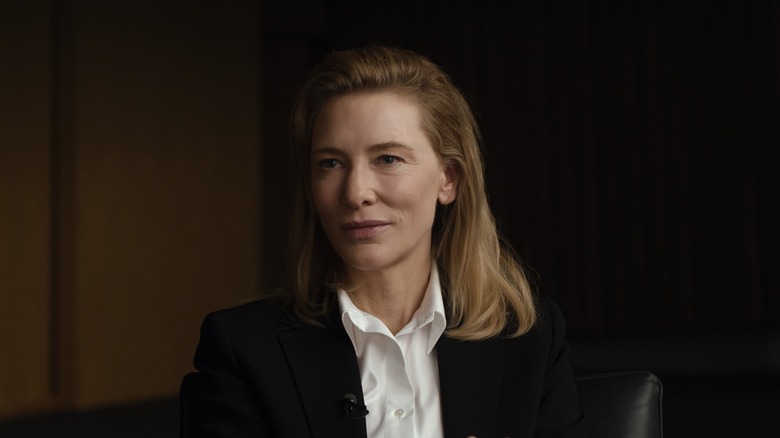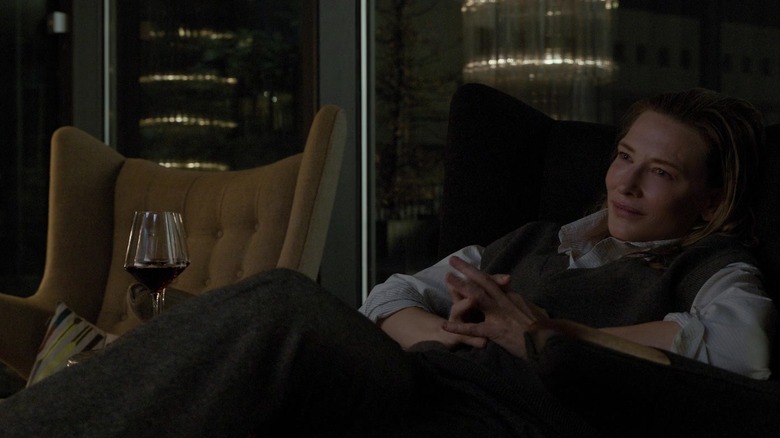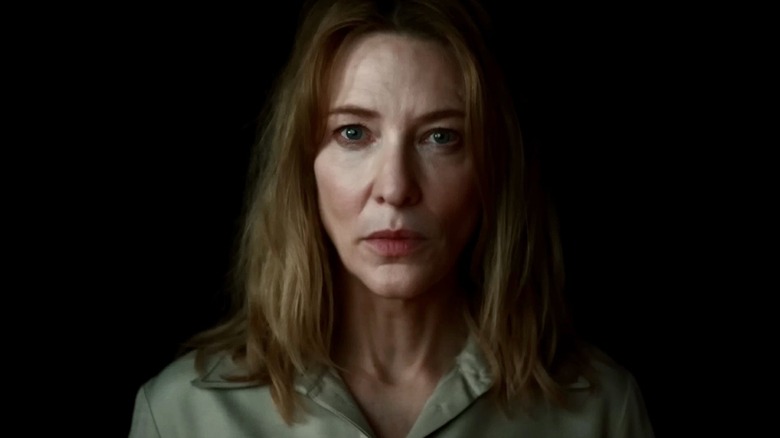Leonard Bernstein's Estate Explains Ties To The Totally Real Lydia Tar
Todd Field's Best Picture-nominated film "Tár" is such a compelling and realistically realized drama, that some audiences have left screenings convinced that the title character, an orchestra conductor named Lydia Tár (Cate Blanchett), is 100% real. The details of the classical film world were so stringent and meticulously researched for "Tár" that many simply believed they encountered a straight-up biography of a real-world celebrity that merely lay outside of their usual field of vision.
Some of the details in Field's screenplay, of course, are something of a giveaway. Lydia Tár, for instance, is an EGOT, a rare achievement only gained by 18 people to date (and congratulations to Viola Davis, the most recent inductee). Other details, however, were perhaps plausible. For instance, Lydia Tár is said to have studied under Leonard Bernstein, the famed conductor and composer. Bernstein's career as a lecturer and professor is long and prestigious, and the famous people he instructed are numerous. His body of work is so vast, almost every art-consuming person on the planet is familiar with his work. Of course, someone as vaunted as Lydia Tár studied under him, right?
Over the course of "Tár," however, audiences see that Lydia is a compulsive liar, and has been moving swiftly to cover up a sex scandal that threatens to boil over. She is also a proven exaggerator who may be faking any or all of her credentials. That's certainly the way Field feels, stating in a recent Variety interview that Lydia definitely lied about working with Bernstein.
The Leonard Bernstein Estate, however, recently came out in the New Yorker to refute Field's claims ... and to confuse hoodwinked viewers all the more. It seems Lydia Tár did study under Bernstein in 1990.
This is real
Previously, in an earlier interview with the New Yorker, Field pointed out that Lydia's claims of working under Leonard Bernstein as a teenager could be easily refuted anyway. Given Lydia's age and the time of Bernstein's death, the two could not have crossed paths, even if she was not fictional. Nonetheless, Field feels that the Bernstein Estate would happily back up Lydia's lies anyway, given the positive publicity it would accrue. His exact words were:
"It would be good for the Bernstein estate to let her lie about her association with Leonard Bernstein, even if she maybe never even studied with him, because the optics of that association would be very, very good, given that she's a woman, given how Lenny's life ended. [...] But I don't think she ever studied with Leonard Bernstein. If you look at the math — Lenny dies in what, 1990? When is she studying with Lenny Bernstein? I don't think it happened."
Jamie, Alexander, and Nina Bernstein, the composer's three children, wrote to the New Yorker, "incensed" that Todd Field would be so flip to dismiss Lydia Tár's claims, saying:
"In Michael Schulman's interview with the director Todd Field, Field speculated that the fictional protagonist of his new movie, the conductor Lydia Tár, might have lied about studying with our father, Leonard Bernstein. As representatives of Bernstein's estate, and in the spirit of the ongoing hubbub over the film, we can assure Field that his heroine was a teen-age prodigy whose talents were so formidable that she was granted special permission to be one of Bernstein's conducting students at Tanglewood in the summer of 1990, during the final year of Bernstein's life."
What's going on here?
The Berstein statement continues:
"His impact on her artistry is indelible, down to her churning 'washing machine' movements, an intriguing adaptation of Bernstein's legendary podium style."
The Bernstein representatives were additionally miffed by Field's implication that Leonard required an association with another famous composer as some sort of mercenary attempt to boost his own profile or, worse yet, to stave off accusations of sexism. Bernstein regularly worked with young men and women for years to encourage the art of conducting and appreciation for classical music. The statement concluded:
"If Field meant to imply that Bernstein's reputation could benefit from an affiliation with female conductors, Tár herself, as Bernstein's most famous protégée, could point out that he taught both women and men. He also introduced millions of girls and boys to the joy of music through his televised Young People's Concerts, the very ones Tár obsessively watched on videocassette. Bernstein inspired thousands of viewers to dedicate themselves to music — precisely what happened to Tár."
The videocassette reference, it seems, is a bit of a joke. Near the end of Field's movie, Lydia is revealed to be an owner of one of the Young People's Concerts on VHS, perhaps — Field posits — the character's only direct contact with Bernstein. The Bernstein estate denied this was the case. Any readers of the New Yorker who thought Lydia Tár was real are now merely further convinced.
Lydia Tár herself, meanwhile, couldn't be reached for comment.


